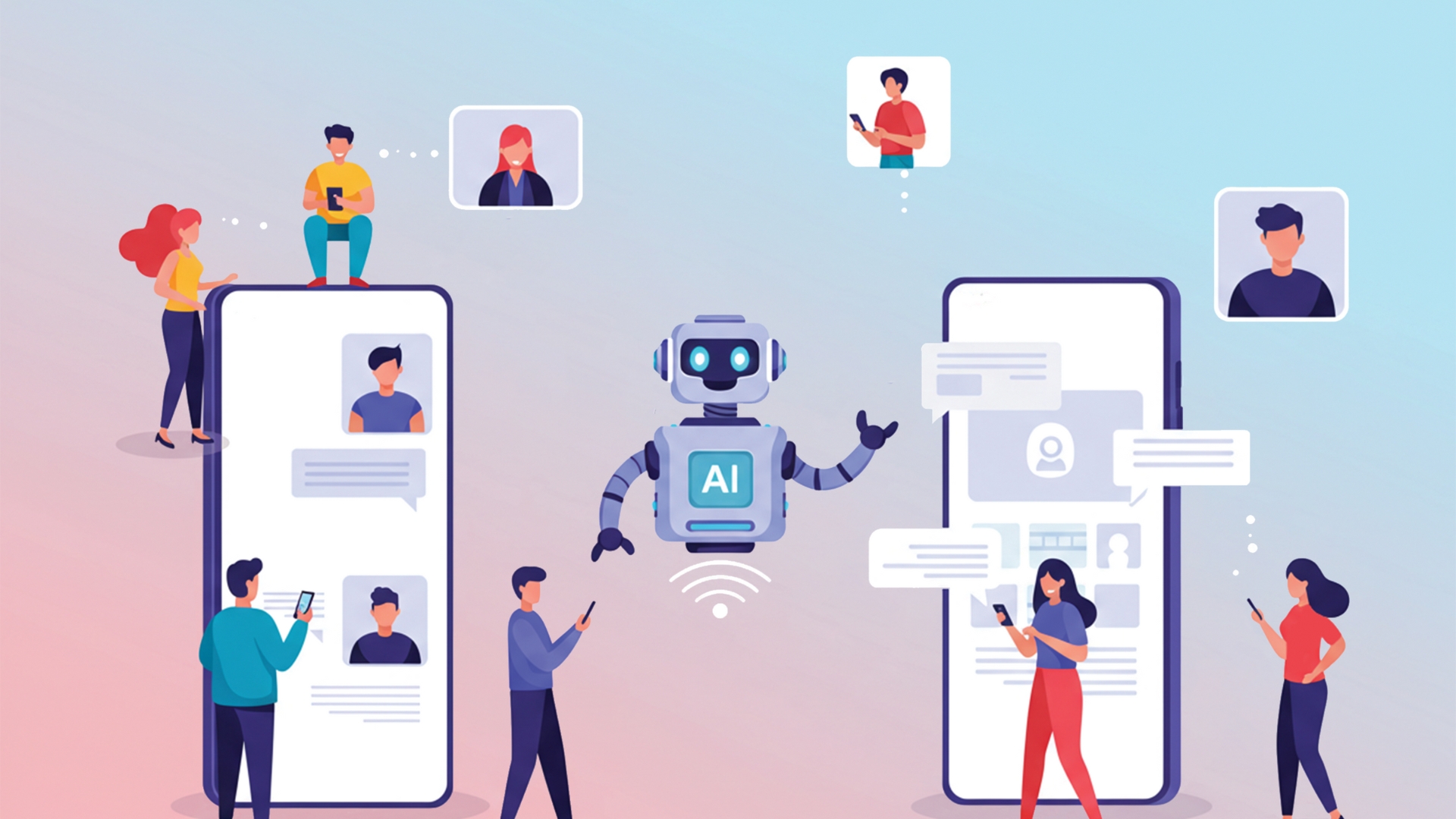Unlocking the potential of artificial intelligence in app development
Artificial Intelligence (AI) is transforming the way applications are developed, offering powerful new capabilities that go beyond traditional app features. AI in app development is not just about building smarter apps, it's about creating intelligent systems that can learn from user data, automate tasks, and enhance decision-making processes. From AI-powered chatbots to predictive analytics, AI is revolutionizing how businesses create, manage, and deploy apps across industries.

The growth of AI in app development
The global AI market in application development is experiencing significant growth. According to Statista, the global AI market is expected to reach $190.61 billion by 2025, growing at a 42.2% CAGR. As businesses look for innovative ways to stay competitive, integrating AI into app development has become a strategic priority. Companies that incorporate AI into their applications can not only enhance the user experience but also drive operational efficiencies and boost profitability.
AI is especially valuable in enabling data-driven apps. By processing and analyzing large datasets, AI models can generate insights, automate decision-making, and personalize user interactions in real-time. Whether it's in e-commerce, healthcare, finance, or entertainment, AI has applications that allow businesses to deliver smarter, more intuitive apps.
Why AI in app development matters
For business leaders, understanding the potential of AI in app development is critical to staying ahead of competitors. Here’s why AI-driven app development is essential:
- Automated processes and task management
AI enables apps to automate repetitive tasks, saving time and resources. For instance, AI-powered apps can automate data entry, manage customer queries through chatbots, and perform routine analysis, freeing up human resources for more strategic tasks. - Personalized user experiences
AI enhances user engagement by tailoring content, recommendations, and notifications based on individual preferences and behavior. For example, e-commerce apps use AI to recommend products based on user behavior, while news apps provide customized content based on reading habits. These personalized experiences lead to higher customer satisfaction and improved retention. - Smarter decision making with predictive analytics
AI apps can analyze vast amounts of historical data to predict future trends or behaviors. For example, AI-powered finance apps can predict market fluctuations, while healthcare apps can predict potential health risks, enabling users to take preventive measures. - Improved security
Security is a top concern for businesses and users alike. AI enhances app security by enabling features like biometric authentication, fraud detection, and real-time threat analysis. With AI, apps can learn from user behavior and recognize anomalies to flag potential threats instantly.
2. The importance of AI in modern app development
Artificial Intelligence (AI) is rapidly becoming a cornerstone of modern app development, offering businesses the opportunity to create smarter, more efficient, and more personalized applications. As technology advances, the role of AI is expanding beyond traditional functionality, enabling apps to interact with users in more meaningful and intuitive ways. This section explores why AI is crucial in today’s app development landscape and how it can drive significant benefits for businesses.
1. Enhancing user experience through personalization
One of the most powerful capabilities of AI in app development is its ability to personalize the user experience. Users today expect tailored experiences, and AI delivers exactly that by analyzing behavior, preferences, and interactions. AI empowers apps to adapt in real-time, making every interaction feel more relevant to the user.
- Recommendation systems: AI-driven recommendation engines, like those used by Netflix, Spotify, and Amazon, analyze users' past behaviors to suggest personalized content or products. These systems help increase user engagement and retention by making content discovery seamless and enjoyable.
- User interface (UI) optimization: AI can also modify the app's layout and features based on a user's preferences, making it more intuitive and easier to use. For example, in e-commerce apps, AI can rearrange product categories, highlight sales, or suggest deals based on browsing habits.
AI-driven personalization is no longer just a "nice-to-have" feature, it's an expectation. Businesses that integrate AI into their apps are better positioned to meet user demands and keep their customers coming back.
2. Automating routine tasks for operational efficiency
AI in app development doesn't only benefit the user experience it also streamlines business operations. Automating routine tasks reduces the workload on human teams, allows businesses to operate more efficiently, and ultimately saves time and money.
- Customer support automation: Many apps now integrate AI-powered chatbots and virtual assistants that can answer customer queries, solve issues, and even process transactions. This reduces the burden on customer service teams while offering users 24/7 support.
- Task automation: In productivity apps, AI can automate tasks like scheduling, reminders, and task prioritization. Apps can learn from users’ preferences and past actions to suggest the most relevant tasks or even make automatic decisions on their behalf.
3. Enabling smarter decision-making through predictive analytics
AI is revolutionizing decision-making by enabling apps to process vast amounts of data and deliver actionable insights. Predictive analytics powered by AI helps businesses make data-driven decisions, forecast trends, and plan more effectively.
- Market predictions and trend forecasting: In finance apps, AI analyzes historical market data to predict future trends, helping users make better investment decisions. Similarly, in retail apps, AI can predict demand for products, optimize inventory levels, and even suggest pricing strategies.
- Real-time decision-making: AI-driven apps can make decisions in real-time based on changing data inputs. For example, in logistics apps, AI can predict delays, optimize delivery routes, and reroute drivers based on traffic data and weather conditions.
4. Improving security and fraud prevention
Security is a significant concern for mobile apps, especially those handling sensitive user data like banking, e-commerce, and healthcare. AI plays a critical role in strengthening app security by identifying potential threats, preventing fraud, and enhancing user verification.
- Fraud detection and prevention: AI models can detect unusual patterns in financial transactions, identify potential fraud, and alert users in real-time. Payment apps like PayPal and Venmo use AI to analyze spending patterns and flag suspicious activities.
- Biometric authentication: AI-enabled apps increasingly use facial recognition and fingerprint scanning to verify user identity, making it easier for users to securely access apps without remembering passwords.
AI’s role in enhancing security not only protects users but also strengthens business reputation by demonstrating a commitment to safeguarding personal and financial data.
5. Enhanced customer insights and personalization
AI not only personalizes user experiences it also provides businesses with deeper insights into their customers' needs and behaviors. This enables businesses to continuously improve their apps and tailor their offerings to better serve their audience.
- Customer sentiment analysis: AI can analyze customer feedback, reviews, and social media posts to gauge sentiment and understand what users like or dislike about an app. This helps businesses identify areas for improvement and address customer concerns in real-time.
- Real-time personalization: AI can make instant decisions based on data, allowing apps to dynamically adjust content, offers, and services to match user preferences. For example, a streaming app might adjust its recommendations based on recent viewing habits, or a fitness app might modify workout plans based on real-time health data.

4. Steps to building an AI-powered app
Building an AI-powered app isn’t a one-size-fits-all process, but there are key steps that every business should follow to successfully integrate AI into their application. From identifying the right AI use cases to selecting the right tools and technologies, these steps can guide you through the process of developing an AI-driven app that provides real value to both users and the business.
1. Define the problem you want to solve with AI
Before diving into the technical aspects, it's essential to clearly define what problem AI will solve for your app. AI can automate processes, enhance user engagement, or provide insights, but these capabilities must be applied strategically to make the app truly valuable.
- Identify pain points: Assess your existing app or business process to find where AI can make the most impact. Whether it’s improving customer service through chatbots, personalizing user recommendations, or predicting user behavior, define the problem that AI will solve.
- Set measurable goals: Be clear about the outcomes you expect from AI integration. Whether that’s increasing user engagement, improving customer satisfaction, or automating a specific process, having clear KPIs will help guide your development process.
By defining a problem and setting goals, businesses can ensure their AI implementation is focused, actionable, and aligned with business objectives.
2. Choose the right AI tools and platforms
Once you’ve identified your AI use case and goals, the next step is selecting the right AI tools and platforms to build your app. The market offers a wide array of AI frameworks, libraries, and cloud services that can accelerate your development process.
- Machine Learning Platforms: Platforms like TensorFlow, PyTorch, and Keras are some of the most widely used open-source libraries for training AI models. Depending on your use case (e.g., NLP, computer vision, or recommendation systems), you can choose the most appropriate platform.
- Cloud AI services: For businesses that want to speed up development without the heavy lifting of building custom models, cloud-based services like Google Cloud AI, AWS SageMaker, and Microsoft Azure AI offer pre-built machine learning models, APIs, and tools for easy integration.
3. Collect and prepare high-quality data
AI thrives on data, and the more high-quality data you can provide to train your models, the better the outcomes. The next step in the AI app development process is gathering and preparing the data that will fuel your AI models.
- Gather relevant data: For AI to function effectively, it needs relevant and comprehensive data. This could include historical customer behavior, transaction data, or user-generated content, depending on the app’s focus. Ensure the data you collect is representative and aligned with the AI’s purpose.
- Data cleaning and preprocessing: Raw data is often messy and unstructured. Clean your data by removing duplicates, handling missing values, and transforming it into a format that can be fed into AI models. The more accurate and clean your data is, the better the AI model will perform.
4. Train and test your AI model
Once you’ve gathered and prepared your data, the next step is training your AI model. This is where the AI starts to learn from the data, identifying patterns and making predictions.
- Model training: Using your data, you will train the AI model. Depending on the complexity of the app, you may need to train models for tasks like image recognition, speech processing, or predictive analytics.
- Model testing and validation: After training, the model should be tested on a new set of data (often called the test set) to assess its accuracy and performance. If the model performs poorly, you may need to adjust the training data, tweak parameters, or choose a different algorithm.
5. Integrate AI into the app
Once your AI model is trained and validated, it’s time to integrate it into your app. This involves embedding the AI model into the app’s backend, ensuring it interacts seamlessly with other features, and testing how it performs in the live environment.
- Integration with the app’s backend: For mobile apps, AI models can be integrated using TensorFlow Lite or Core ML to run efficiently on mobile devices. For web apps, you can use cloud-based AI services like AWS Lambda or Google Cloud AI to run models remotely and provide real-time AI-powered functionality.
- Continuous monitoring: After integration, continuously monitor the AI’s performance to ensure it delivers accurate results and remains responsive to changing user behavior. You may need to periodically retrain the model or fine-tune it as more data becomes available.
6. Test and optimize the app
After integrating AI, the next step is to test the overall functionality of the app, ensuring that all features work as expected and that the AI delivers on its promises.
- Beta testing: Conduct extensive testing, including user acceptance testing (UAT), to see how real users interact with the app and whether AI features meet their needs.
- Optimize and iterate: Use feedback from beta testers to fine-tune both the AI model and the app’s features. Optimize the app for speed, accuracy, and user satisfaction.

5. Common challenges in AI app development
While the potential of AI in app development is vast, it comes with its own set of challenges. For businesses looking to integrate AI into their apps, it’s essential to be aware of these challenges and proactively address them to ensure a smooth development process. In this section, we’ll explore some of the most common obstacles businesses face when developing AI-powered apps and how to overcome them.
1. Technical complexity
AI development is inherently complex. Building and training machine learning models requires significant technical expertise in data science, mathematics, and AI algorithms. Even businesses that have a development team may struggle to integrate AI into their apps, especially when it comes to fine-tuning models and ensuring they perform optimally across various devices.
How to overcome it
- Leverage AI platforms and frameworks: Businesses can use pre-built AI tools and platforms like Google TensorFlow, Microsoft Azure AI, or AWS SageMaker to simplify the development process. These platforms provide APIs and pre-trained models that can be easily integrated into apps without deep AI knowledge.
- Hire or partner with AI experts: Businesses that lack AI expertise should consider collaborating with AI development companies or hiring data scientists to guide the integration process. This ensures that the AI models are trained properly and can scale as needed.
- Use low-code/no-code AI tools: Low-code platforms like Appian or Google AutoML allow businesses to build AI models without needing extensive programming knowledge, making it easier to incorporate AI into their apps.
2. Data quality and availability
AI models thrive on data. However, for an AI app to perform well, it needs access to high-quality, accurate, and relevant data. Businesses often face challenges in obtaining the necessary data or dealing with noisy, incomplete, or biased datasets, which can significantly impact the performance of AI models.
How to overcome it
- Gather clean, labeled data: Ensure that data is well-organized, labeled, and cleaned before feeding it into AI models. This often involves data preprocessing and cleaning tasks, which can be automated using tools like Pandas or OpenRefine.
- Use synthetic data: If real data is scarce, consider using synthetic data to train your models. Synthetic data mimics real-world data but is generated artificially, allowing businesses to bypass data scarcity while still training AI models effectively.
- Ensure data privacy: With growing concerns over data privacy, ensure that the data you collect complies with regulations like GDPR or CCPA. Implement encryption and anonymization techniques to protect sensitive user data.
3. Model training and accuracy
Training AI models to achieve the desired level of accuracy can be time-consuming and resource-intensive. Even after collecting and cleaning data, ensuring that the model learns effectively and generalizes well can be a significant hurdle. Poorly trained models may produce inaccurate predictions or recommendations, negatively impacting user experience.
How to overcome it
- Start small and iterate: Begin by training your AI models on smaller datasets and gradually scale up as performance improves. Iterative development allows for continuous improvement based on feedback and data.
- Use cross-validation techniques: Cross-validation ensures that your model is not overfitting to the training data. It tests the model’s performance on different subsets of data, improving its ability to generalize to new, unseen data.
- Monitor and optimize: AI models should be continuously monitored and optimized even after deployment. Use real-time feedback to fine-tune models and retrain them periodically to ensure their relevance.
4. Resource constraints
Developing and maintaining AI models requires substantial computing power and resources. Mobile devices, in particular, often have limited processing capabilities, which can make running complex AI models on them difficult. Moreover, AI development requires skilled personnel, including data scientists, machine learning engineers, and AI specialists, which may strain a business’s existing resources.
How to overcome it
- Use AI frameworks designed for mobile: Leverage AI frameworks like TensorFlow Lite or Core ML that are specifically optimized for mobile devices. These frameworks allow businesses to run AI models on mobile devices efficiently without compromising performance.
- Cloud-based AI processing: For more resource-heavy models, consider offloading AI processing to the cloud. By using cloud-based services like Google Cloud AI or AWS AI, businesses can run complex models remotely and send the results to the mobile app, ensuring smoother performance on the device.
- Optimize models for efficiency: Focus on creating lightweight models that can run efficiently on mobile devices by using techniques like quantization, pruning, and distillation to reduce the size and complexity of AI models.
Leveraging cloud computing or optimizing AI models for mobile can help overcome resource limitations and ensure AI integration is seamless.
5. User trust and ethical concerns
AI’s reliance on large datasets and complex decision-making processes can raise ethical and privacy concerns, especially regarding user data. Users may feel uneasy about AI algorithms making decisions for them or processing sensitive information, and businesses must ensure that AI models are transparent and operate fairly.
How to overcome it
- Ensure transparency and explainability: Make sure users understand how AI is being used within the app and how it benefits them. Implement explainable AI (XAI) techniques that provide users with understandable explanations of how decisions are made by AI models.
- Implement ethical AI practices: Follow ethical AI guidelines to avoid biases in models and ensure that the data used does not favor specific groups. Regularly audit AI models for fairness and inclusivity.
- Data protection and compliance: Safeguard user data by adhering to data protection laws like GDPR and CCPA. Be transparent about data collection practices and provide users with the ability to control how their data is used.
5. AI app development use cases
Artificial intelligence has a wide range of applications across industries, and its potential is being unlocked through smart, intuitive mobile and web apps. AI is more than just a buzzword transforming how businesses operate, interact with customers, and create products. In this section, we’ll explore a few key use cases of AI in app development, showcasing how AI can be harnessed to solve specific challenges and deliver real-world benefits.
1. Personalized user experiences in e-commerce
E-commerce businesses are increasingly relying on AI to provide hyper-personalized shopping experiences. AI-powered recommendation systems analyze a user’s browsing behavior, past purchases, and search history to suggest products that they are most likely to purchase. This leads to higher conversion rates and greater customer satisfaction.
- Example: Amazon’s recommendation engine uses AI to suggest products based on user behavior, leading to 35% of its total revenue from personalized recommendations.
2. AI-driven chatbots for customer support
Customer support is one of the most prominent areas where AI is making a difference. AI-driven chatbots and virtual assistants can handle a range of customer queries, from answering frequently asked questions to resolving complex issues. These bots operate 24/7, ensuring that users receive instant assistance without the need for human intervention.
- Example: H&M, a fashion retailer, uses AI-powered chatbots to assist customers in browsing products and making purchase decisions.
3. Predictive analytics in finance apps
In the finance sector, AI is transforming how businesses and individuals make decisions. AI-powered apps use predictive analytics to analyze market trends, forecast asset prices, and identify investment opportunities. This helps investors make smarter financial decisions based on real-time data.
- Example: Wealthfront, a robo-advisor, uses AI to analyze a user’s financial situation and suggest personalized investment strategies.
4. AI-powered healthcare apps for diagnostics
AI has enormous potential in the healthcare sector, especially in developing apps that assist in diagnostics, patient monitoring, and wellness tracking. AI models can process medical data, analyze symptoms, and provide diagnostic suggestions, helping doctors make faster and more accurate decisions.
- Example: Babylon Health uses AI to analyze symptoms and provide virtual consultations to patients, making healthcare more accessible and efficient.
5. Intelligent voice assistants for productivity apps
Voice assistants powered by AI are becoming increasingly common in productivity apps, allowing users to interact with their apps hands-free. These AI-powered assistants can manage tasks, schedule meetings, set reminders, and even perform more complex functions like drafting emails or processing documents.
- Example: Google Assistant and Apple Siri are examples of AI-powered voice assistants embedded into mobile productivity apps, helping users stay organized and efficient.
6. AI in autonomous vehicles and navigation apps
In the automotive and transportation sectors, AI is powering self-driving technologies and optimizing navigation apps. AI algorithms process real-time traffic data, road conditions, and user preferences to provide the fastest, most efficient routes.
- Example: Tesla uses AI to power its autonomous driving features, enabling its vehicles to navigate and make driving decisions without human intervention.

6. The future of AI in app development
AI is not a passing trend in app development, it's the cornerstone of the next generation of intelligent applications. As AI technologies continue to evolve, the potential for more advanced, efficient, and user-centric apps grows exponentially. The future of AI in app development promises a host of exciting opportunities, from enhanced automation to more powerful personalized experiences. In this section, we’ll explore the future trends and innovations in AI for app development and what businesses can do to stay ahead of the curve.
1. AI-powered personalization will reach new heights
Personalization will continue to be a key driver of user engagement in AI-powered apps. In the future, apps will not just respond to user preferences; they will anticipate them before users even ask. By leveraging more advanced machine learning and predictive analytics, apps will be able to understand the context and dynamics of user behavior in real-time, providing hyper-personalized experiences at an unprecedented level.
2. More advanced natural language processing (NLP)
AI-driven natural language processing (NLP) is evolving rapidly. Voice and text-based communication in apps will become far more intuitive, allowing users to interact with apps using natural, conversational language no longer limited to predefined commands or phrases.
3. AI-driven automation will redefine business operations
The future of AI in app development isn’t just about enhancing user experiences, it's about automating complex processes to drive business efficiency. AI-powered automation will continue to evolve, transforming back-end operations like data analysis, customer service, marketing, and inventory management.
4. AI-enabled security for more robust protection
With the increasing amount of sensitive data being processed through apps, AI will play a vital role in enhancing security. As cyber threats evolve, AI’s ability to predict and prevent potential security breaches in real-time will become even more sophisticated.
5. Autonomous AI-powered apps
Looking further ahead, autonomous AI-powered apps will emerge. These apps won’t just be reactive, they will be able to operate independently and make decisions without constant human input. AI will handle everything from app optimization to user interaction in real-time.
For more insights on integrating AI into your app development strategy, visit our AI Agent Development services.
7. How businesses can get started with AI app development
AI is no longer just an exciting frontier for tech enthusiasts, it's a business imperative. If your organization is looking to build or integrate AI into its app development strategy, it’s important to follow a structured approach to ensure successful implementation. In this section, we’ll guide you through the steps businesses should take to get started with AI app development, from identifying the right AI use cases to selecting the tools and platforms that suit your needs.
1. Identify AI use cases and define business objectives
Before diving into the technical aspects of AI app development, it’s essential to define what problem you want AI to solve. Whether you’re aiming to enhance the user experience, automate processes, or provide personalized recommendations, understanding the specific use case is critical to aligning AI with your business goals.
2. Select the right AI tools and platforms
AI development requires specialized tools, frameworks, and platforms. Choosing the right ones can significantly reduce time-to-market and help you avoid technical bottlenecks. There are numerous platforms available, from pre-built AI models to cloud services that streamline AI deployment.
3. Gather and prepare the data
AI models are only as good as the data they are trained on. High-quality, relevant data is essential for building accurate and effective AI systems. Businesses often struggle with data quality and data preparation, which can significantly impact AI performance.
4. Develop and train your AI model
Once the data is ready, the next step is to build and train your AI model. The model needs to learn from the data to identify patterns and make predictions or recommendations. This phase can be the most time-consuming, but it’s where the magic of AI happens.
5. Integrate AI into your app and test the user experience
With the AI model developed, the next step is integration. AI functionality must be seamlessly incorporated into the app, ensuring it provides a smooth user experience without affecting the app’s performance. Testing is key to ensuring everything works as expected.
6. Monitor, update, and iterate
AI is not a set-it-and-forget-it solution. To remain effective, AI models need to be continuously monitored and updated to adapt to new data and changing user behaviors. This phase ensures the AI continues to deliver value over time.
Why businesses should integrate AI in their apps now
AI is increasingly becoming a critical component for businesses that want to stay competitive in the modern app market. The benefits of AI app development, personalization, automation, predictive insights, and security are clear. However, integrating AI isn’t without its challenges. The key to successful AI app development lies in planning strategically, addressing technical and data hurdles, and partnering with experts who can guide you through the process.
For businesses looking to gain a competitive edge, the time to adopt AI is now. By starting small, testing AI applications, and iterating based on user feedback, businesses can unlock the full potential of AI and continuously refine their offerings. In doing so, they will not only enhance the user experience but also create more value for their business operations and overall growth.
To get started on your AI app development journey, reach out to us for expert guidance and solutions.




















